Fantasy Premier League: How to become a champion
- Published
Have you picked your Fantasy Football team for the new season yet?
Last season, 36-year-old Simon March, who works in digital marketing, beat more than 3.5 million others to the Premier League title. Here he shares his secrets, including his 10 top tips for picking and managing a winning side.
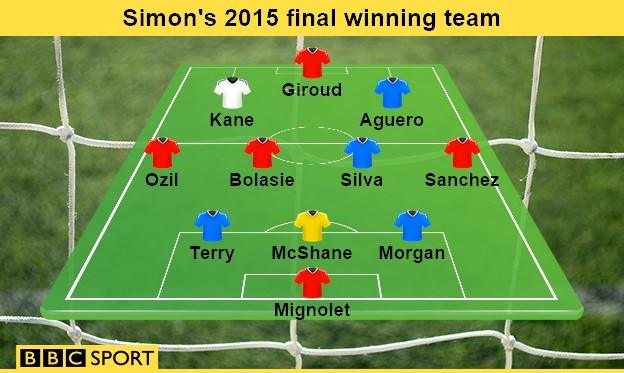
How long per week do you spend on Fantasy Football?
I try not to over-think it but it's often where my mind wanders when I'm stuck in traffic or queuing for something. It's also a great source of office and pub banter. It probably gets discussed more than real football now.
How did you get into it?
This will be my seventh season but I only really started playing properly a few years ago when I joined a work mini-league. It was taken quite seriously as, along with bragging rights, it had an entry fee and prize money. I'm not sure they're going to invite me back again this year…
Who is best bargain/unknown you have had?
Dusan Tadic was a major differential for me early in the season but John Terry was probably the real game-changer when he scored three goals in four games over Christmas. I remember thinking he was 'due a goal' beforehand. It's one of those nice but rare occasions when a gut prediction like that actually pays off.
1. The key players
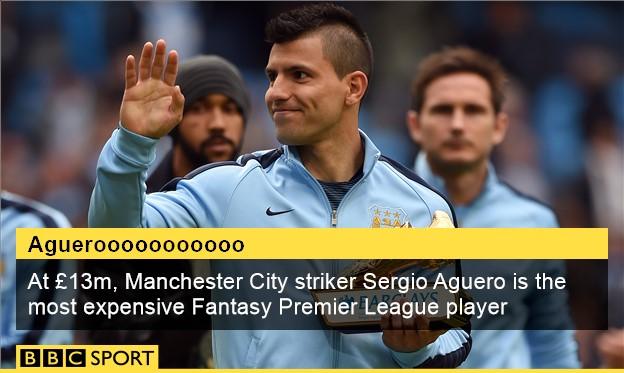
Top picks: Wayne Rooney, Diego Costa, Jordan Henderson, David Silva
Having already delivered season after season, Chelsea's Eden Hazard and Manchester City striker Sergio Aguero practically pick themselves, as might Alexis Sanchez after his explosive debut season at Arsenal.
However, with doubts over whether the latter two will start the season following their late return from the Copa America in Chile, I think Wayne Rooney offers a great early season captaincy option at Manchester United. Now stationed up front, Rooney has an excellent goalscoring record against each of his first three opponents - Tottenham, Aston Villa and Newcastle.
Fit-again Diego Costa is hard to ignore after delivering so consistently for Chelsea last season and Jordan Henderson looks good value as he appears poised to inherit set-pieces in the wake of Steven Gerrard's departure at Liverpool.
Finally, David Silva's consistency and all-round involvement in Manchester City's attacking play makes him another intuitive selection.
2. Players to keep an eye on
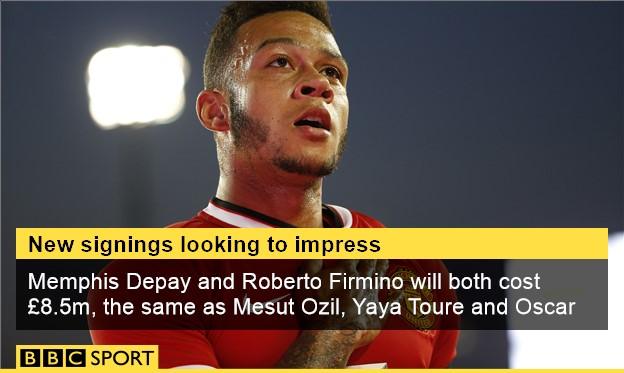
Worth a look: Callum Wilson, Troy Deeney, Aleksandar Mitrovic, Patrick Bamford, Matt Ritchie, Memphis Depay, Dimitri Payet, Mesut Ozil, Yaya Toure, Juan Mata, Diafra Sakho
There is plenty of potential value among the players new to the Premier League this season, especially in the forward positions.
Bournemouth's Callum Wilson and Watford's Troy Deeney (both Championship) and Newcastle's Aleksandar Mitrovic (Belgian top flight) are arriving off the back of prolific goalscoring seasons in their respective divisions.
Chelsea loanee and Championship Player of the Season Patrick Bamford will gain lots of attention if he can cement a spot up front in Alan Pardew's increasingly attacking Crystal Palace team.
Finally, in the budget-friendly category, with set-pieces and plenty of attacking threat, Bournemouth midfielder Matt Ritchie could be the one to watch if he can reproduce last season's Championship title-inspiring form in the Premier League.
In the more premium category, new signings Memphis Depay and Dimitri Payet bring flair, creativity and an eye for goal to Manchester United and West Ham respectively. How quickly they adapt to the Premier League, however, will be critical in assessing their value as assets.
Among the already established Premier League players, I'll be monitoring Arsenal's Mesut Ozil, Yaya Toure at Manchester City, Juan Mata at Manchester United and West Ham's Diafra Sakho particularly closely. All four could be poised for a big season ahead and will each offer good value if they can deliver.
3. Look at the team first, then the player
Cheap defenders who play in teams that prioritise defence will often score more points than costlier alternatives who play in more attack-minded teams. Equally, a good striker in a team which generates a lot of chances may score more goals than a star striker in a more defence-minded team.
The nature of a team can limit or amplify a player's point-scoring potential. Reviewing the overall characteristics and strengths in teams before you decide which players to select can help you to identify players with great scoring potential and to uncover undervalued assets.
4. Look for players who suit the game
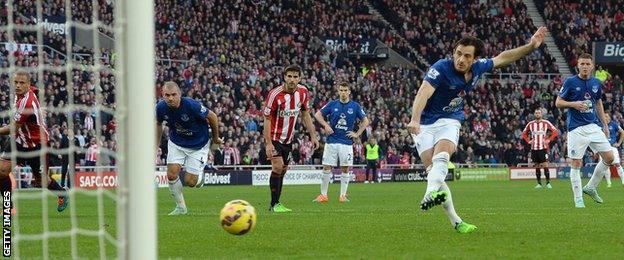
Everton full-back Leighton Baines scored two goals, provided nine assists and kept nine clean sheets last season
The scoring system in Fantasy Football favours certain types of players over others. The highest-scoring players are typically attackers who are heavily involved in a high-scoring side.
This could mean that they are the main focal point of the attack, such Olivier Giroud at Arsenal or Harry Kane at Tottenham or they are a key source of creativity such as Silva at Manchester City or Cesc Fabregas at Chelsea.
Players who take set-pieces, especially penalties, are particularly valuable and it's worth trying to identify who these are before you make your selection. Finally, defenders with strong attacking output such as Leighton Baines at Everton or Branislav Ivanovic at Chelsea can offer you a big advantage if you own them at the right time.
5. Keep your squad flexible
The start of the season offers many unknowns, so try to keep your initial squad flexible and dynamic. Avoid spending too much of your budget in attack at the expense of your defence or midfield and select players from a range of prices in each category. This will allow you viable transfer options should you need them and it will put you in a strong position to move quickly on any emerging form players.
Avoid taking too many risks with your initial player selection. A few keeps it interesting but try to make sure they're balanced out by a greater number of proven fantasy football performers.
6. Watch out for highly owned players
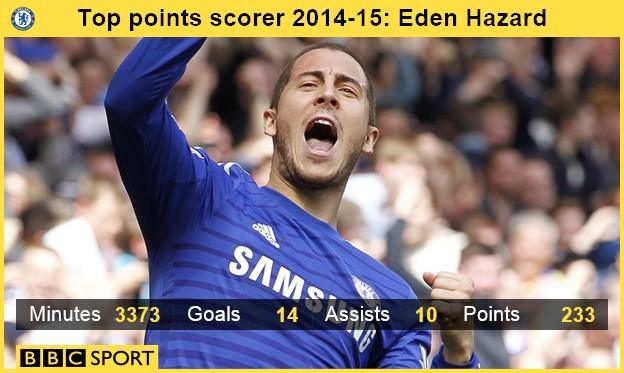
Players who are highly owned among managers can have a defining impact on individual gameweeks and the season as a whole.
Historically, star players such as Cristiano Ronaldo and Luis Suarez have pushed towards 50% ownership in a season and it can be devastating to your league position if you are lacking such players when they deliver.
Keeping an eye on the 'Teams Selected by %' statistics can help you to identify which players it might be too risky to go without. If you find yourself chasing a lead, this data can also help you identify the lesser-owned players you might want to take a chance on to try and close the gap.
7. Look for 'rotations'
Conventional wisdom suggests players perform better in 'easier' fixtures. 'Rotation' is the tactic of swapping between players who have contrasting fixture difficulty so each player only plays in their more favourable fixtures.
This can be an effective method for both maximising value and reducing risk throughout your squad, particularly among defenders and between goalkeepers.
Some local rivals, such as Newcastle and Sunderland, always alternate their home games, offering a straightforward 'home/away' rotation. However, it's worth looking at the fixtures and identifying the range of rotations that are available when choosing your players.
8. Make the most of your transfers
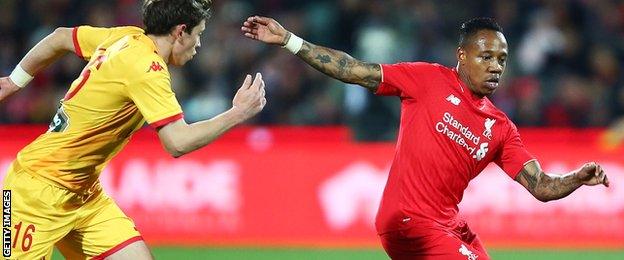
New Liverpool full-back Nathaniel Clyne has been selected in 43.4% of teams; the most for any defender
The single most influential factor for success is, in my opinion, how effectively you use your transfers throughout the season.
Where possible, try to 'carry-over' free transfers. Using two transfers in one go can make a far more dramatic difference to your team than using just one transfer each week.
Try to leave your transfers as late as possible in the gameweek, allowing yourself the opportunity to absorb as much team information as possible from news conferences and other sources. This will help you avoid squandering transfers on players who become injured or unavailable.
Patience is key when it comes to using your transfers effectively. When a player scores a surprise points haul, it's often worth waiting to see how well they perform in the next game before transferring them in, this helps you avoid wasting transfers on one-off performers. Equally, it often pays to keep faith with proven performers, even if they are experiencing a run of poor form. Usually it's only a matter of time before they start scoring again.
9. Follow player prices
In Fantasy Premier League, player prices rise and fall throughout the season as managers transfer them in and out. It operates and fluctuates like a virtual stock exchange. If you can predict the purchase behaviour of other managers and move on a player early before their price rises, you can profit through increased team value.
A high team value can become a big advantage later in the season as it permits a larger budget to spend on premium players. One way to help predict which players might rise or fall in price is by reviewing the 'Transfers In/Out Round' statistics for the current gameweek.
10. Break the season down into parts
In many ways, the season is actually a collection of smaller games, each offering a different challenge and each requiring a tailored strategy.
Key stages in the season include the season start, the intense winter schedule, international breaks, double gameweeks (where a team has more than one fixture) and the season finale. These are often where seasons are won and lost.
Identifying these stages early on allows you to adjust your team and strategy in the preceding weeks to help prepare for them. Typically, these periods bring some uncertainty over line-ups so it can pay to go into them with a strong bench.
As a general rule, I try to plan for about four gameweeks ahead. The plan doesn't usually survive even nearly that long but the process helps to keep things on track.
Simon competes in the Fantasy Premier League competition. National newspapers and other media outlets also run versions of the game.
- Published4 August 2015

- Published3 August 2015
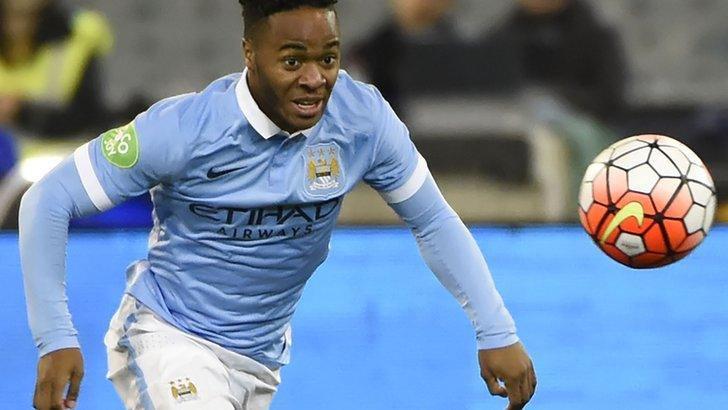
- Published4 August 2015
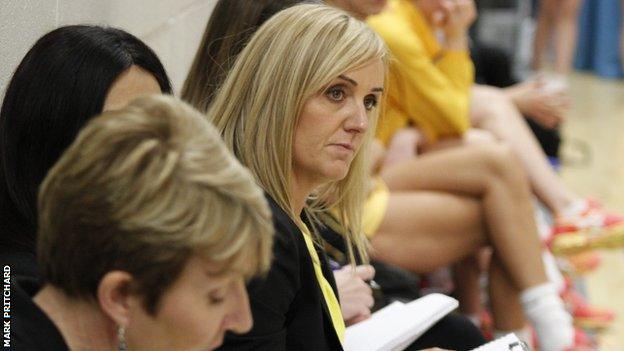
- Published20 June 2016

- Published7 June 2019

- Published2 November 2018
